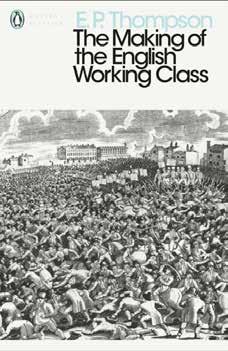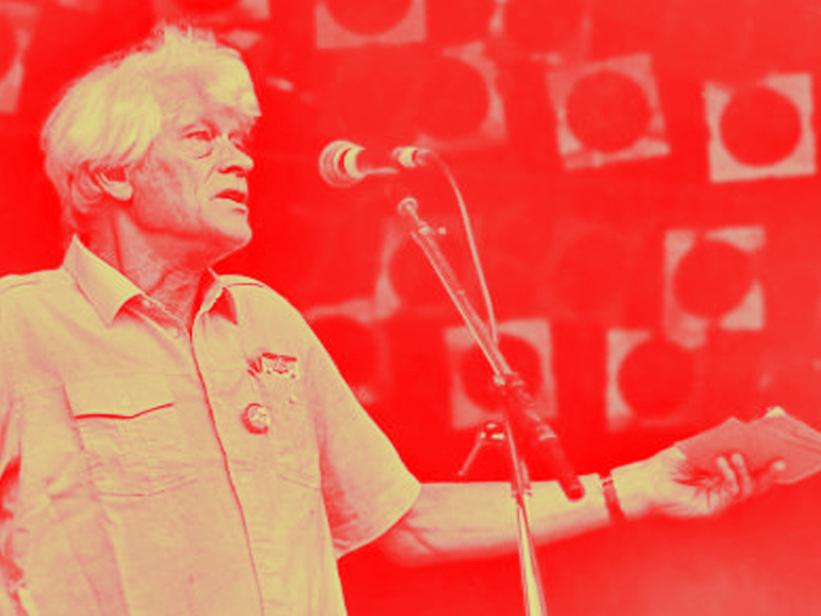
6 minute read
Alex Beard Marx, History, Humanism: why E.P. Thompson still matters
Marx, History, Humanism: why E.P. Thompson still matters
Alex Beard, History and German at University College
Advertisement
“Few spectacles would be more ludicrous than that of an English historian – and, moreover, one manifestly self-incriminated of empirical practices – attempting to offer an epistemological correction to a rigorous Parisian philosopher.”
These words preface a two-hundred-odd word polemic against the French philosopher Louis Althusser. The English challenger in question is Edward Palmer Thompson: one of 20th century Britain’s most formidable public intellectuals and, along with the venerable Eric Hobsbawm, perhaps its most obvious byword for ‘Marxist historian’.
It is impossible to consider both Thompson’s personal and academic histories without taking these two signifiers – ‘Marxist’ and ‘historian’ – to be inseparable. There was no point at which his historical enquiry was not subject to a well-applied materialist logic, and no point at which he did not attempt to understand the past as it was experienced by the masses who lived and attempted to make it. Similarly, his own political activity was governed firmly by the understanding that it is within people’s power to make their own history, even as they do so in circumstances outside of their control.
Thompson’s intellectual and political crusades began simultaneously. Having studied at Corpus Christi, Cambridge, he joined the circle of Communist Party historians who owed their rhetorical vigour and academic rigour to the Marxist world-view they had developed as students. That they numbered such famous names as Hobsbawm, Christopher Hill, and George Rudé is no remarkable coincidence. In a field which had been overwhelmingly concerned with kingship, constitution and diplomacy, the Marxists’ revolution was to interrogate the historical experience of those who actually lived it. And a materialist approach to the past enabled an explanation of historical causation and change that comfortably usurped the shaky defences of ‘Great Men’ offered up by liberal historiography.
The fledgling group largely disbanded in 1956, after some of its most notable members (with Hobsbawm a controversial exception) left the Party in protest at Soviet forces’ brutal suppression of a popular uprising against the Hungarian regime. Thompson –who left along with his wife, the pre-eminent historian of Chartism, Dorothy née Towers – cited a lack of “free activity and democratic initiative”. These features would be key to the unapologetically humanist Marxism that Thompson would expound up to his death. His departure was as much an assertion of intellectual integrity as an act of political resistance.
As early as his Communist Party days, Thompson had made clear the idiosyncrasies of both his history and his Marxism. His earliest published work was not a study of the English or French revolutions, nor a detailed history of the labour movement, but rather an (arguably overly) expansive biography of the literary figure and socialist William Morris. The vibrancy of history lay for
Thompson not merely in its social and economic, but also in its cultural and intellectual dissenters. Ever the agitator, Thompson’s genuinely radical and conflictual politics – accompanied by a caustic polemical style – fit far better the dissident New Left than the stasis of institutionalised Leninism.
Few others could have written The Making of the English Working Class: Thompson’s masterpiece. Fewer still could have made it as characteristically and, it must be said, at times frustratingly long. It is difficult to overstate the book’s impact on the historical discipline, its most famous quote the closest thing you might find to a founding maxim of social history. Accompanying a black-and-white still of a wizened Thompson, it is writ large on the back of my somewhat battered Penguin Modern Classics edition: “I am seeking to rescue the poor stockinger, the Luddite cropper, the ‘obsolete’ hand-loom weaver, the ‘utopian’ artisan, from the enormous condescension of posterity.”
Over nine hundred pages, Thompson documents the emergence of capitalism’s first distinctive working class. In doing so, he redefines the category itself. Class is not merely the function of the economic relationship in which it is grounded – it cannot be intercepted by freezing history at a particular point in time and simply identifying workers and owners – rather it relies on a constant dialogue between social being and social consciousness. Workers are united in theory by their relationship to capital, but in practice only by their social, cultural and political formations. The working class is a living and evolving structure that develops only out of a constant antagonism towards, and struggle against, its exploiters. In Thompson’s study, it was not magicked out of thin air: it “made itself as much as it was made”. There was no class without class consciousness.
Implicit throughout the Making is the synthesis of Marxism, history and humanism which defined his work from 1956: the year in which he “commenced to reason”. Marxist, because he understood that a person’s condition was determined by their relationship to capital, industry and the state, and that only collective, class-based action would allow them to overcome it. Humanist, because he saw that the responses to this condition were diverse and individual, and that their collective transcendence would represent the ultimate assertion of human agency. Historical, because he told the story of real lives rather than merely of impersonal structures, because he gave a human face to human suffering and resistance, and because he believed that the living process of historical change was worth studying, and its logic worth interrogating, because and not in spite of its erraticism.
There were few greater threats to this Thompsonian trinity than Louis Althusser, the patriarch of French structuralism. Historical process, per Althusser, was merely a function of an impersonal and self-reproducing societal structure. What was needed was not an ‘empiricist’ historical enquiry but rather a philosophical theory of this structure. Hence Althusser’s (in Thompson’s eyes, anti-ma-

Thompson speaking at Glastonbury in 1986 terialist) Marxism threatened to render the historical discipline obsolete and to deny humans the historical agency he believed was central to their ability to overcome capitalism. Its intellectual reach having now extended as far as the New Left Review of which Thompson was a co-founder, he believed his intervention against this mutant strain of Marxology to be an existential one. And the tone of The Poverty of Theory, a solid two hundred pages of his most pointed anti-Althusserian invective, does not suggest otherwise.

Thompson’s weapon of choice was the polemic – its blade never sharper than when he was reprimanding someone with whom he shared an ideological epithet. And while his prose is vivid, snappy and highly compelling, the fury with which he directed his rhetorical assaults occasionally went so far as to merit parody. There is more than a hint of sarcasm to be detected in the title of Polish philosopher Leszek Kołakowski’s response to a book-length ‘open letter’ from Thompson: My Correct Views on Everything. Yet even if he took things on occasion a little too personally – “So, my dear Edward, why do you allow yourself so easily to lose your cool?”, remarked George Rudé – his frequent and lengthy intellectual sends demonstrate not merely a formidable mind but a passionate personal commitment to the historical discipline and socialist cause.
We would do well to revisit E.P. Thompson. At a time when so many are coming to terms with the barbaric history of Britain’s ruling class, we might find a place in the alternative, radical tradition to whose struggles we owe such rights as the freedom of the press or universal suffrage. And living as we are through a period of capitalist crisis when so many feel disempowered, disenchanted and decoupled from history, we can look to Thompson’s loving documentation of this popular tradition as we attempt collectively to assert our own agency over the historical narrative.
In the process of reanimating Thompson’s work, we will encounter its limitations. His studies of overwhelmingly white populations are burdened with racial implications he never fully unpacked. And it remains truly up for debate whether ‘Englishness’ can ever be as radical as he suggested. But like any great socialist, Thompson provided us with the tools to critique his own findings. It remains up to us to rescue Britain’s greatest Marxist intellectual from the enormous condescension of posterity.










